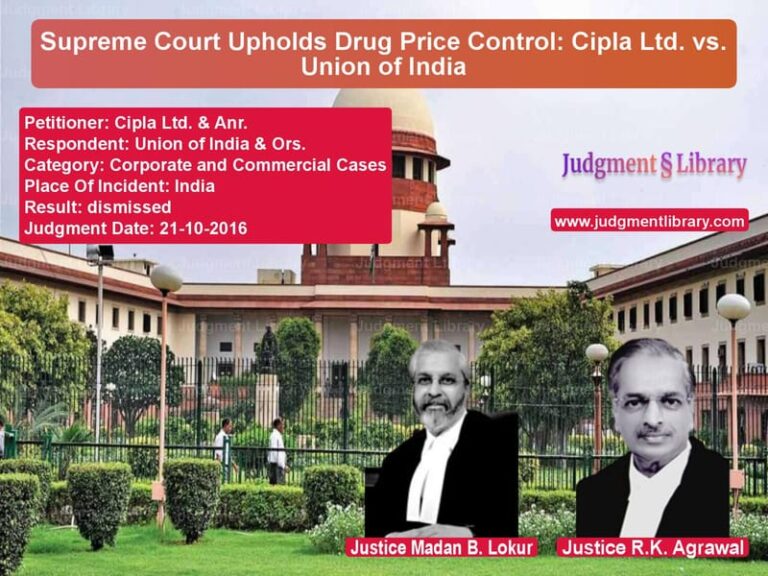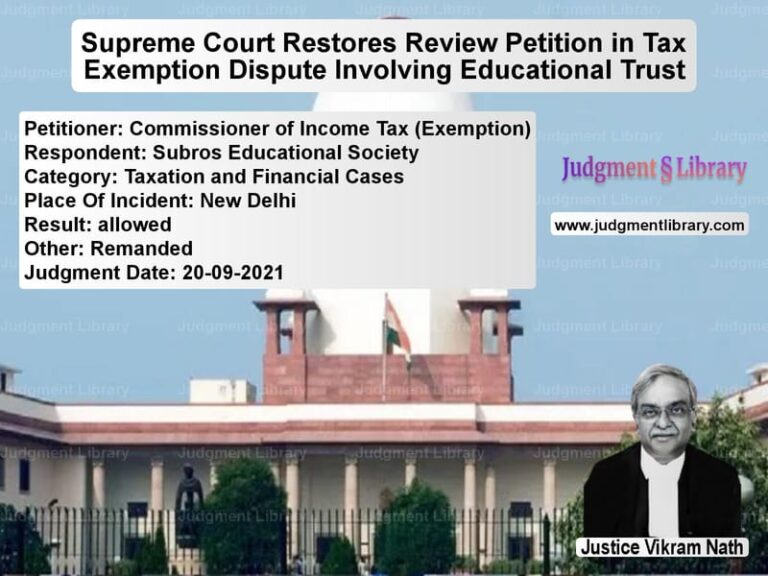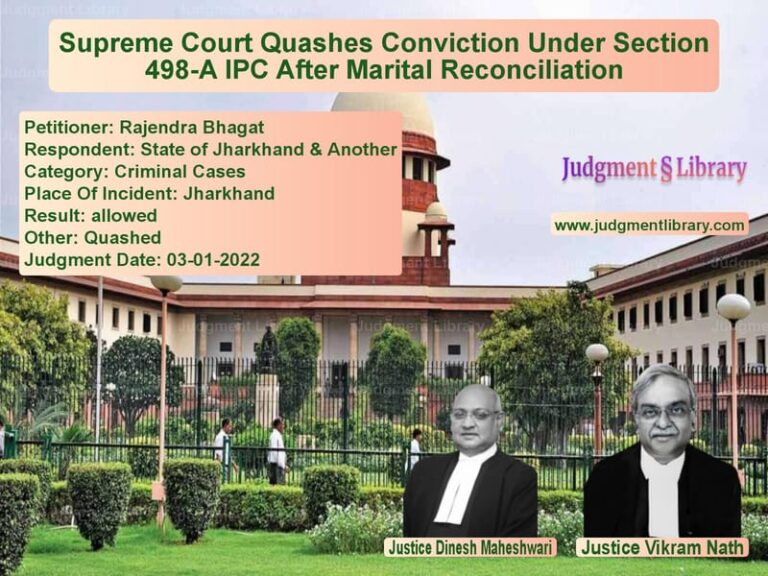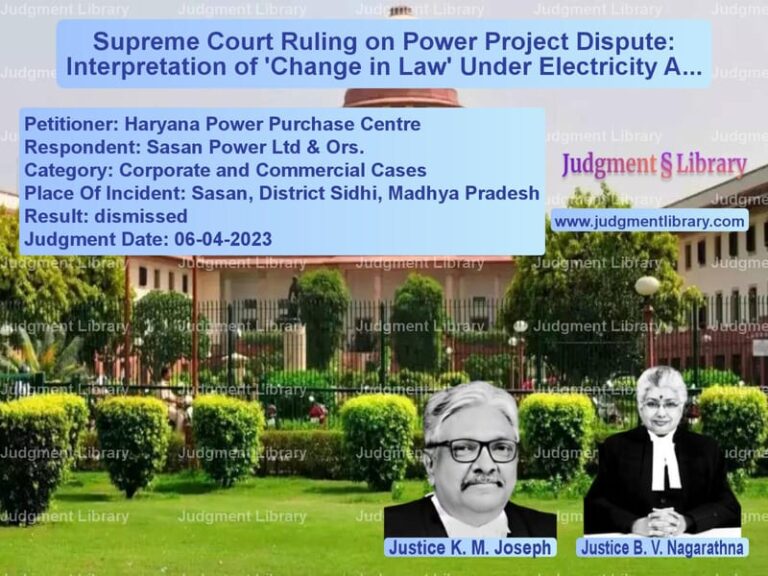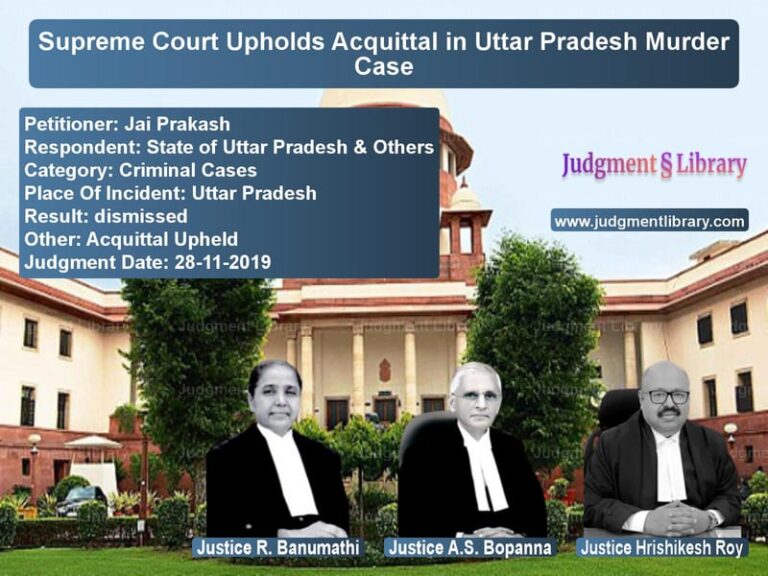Ex-Employees’ Housing Rights: Supreme Court Denies Long-Term Lease Claim
Petitioner Name: Steel Authority of India Ltd.Respondent Name: Choudhary Tilotama Das & Ors.Judgment By: Ranjan Gogoi, JusticeR. BanumathiJudgment Date: Ranjan Gogoi, JusticeR. Banumathi
The case of Steel Authority of India Ltd. (SAIL) vs. Choudhary Tilotama Das & Ors. revolved around the housing rights of former employees who had retired under the Voluntary Retirement Scheme (VRS) of 1999. The Supreme Court of India, in its judgment dated February 12, 2018, ruled against the ex-employees’ plea for long-term lease of their company-allotted quarters.
This case highlights the complexities involved in employer-provided housing policies, the rights of retired employees, and the legal boundaries of lease entitlements.
Background of the Case
The dispute arose when 53 former employees of Rourkela Steel Plant (RSP), a unit of Steel Authority of India Limited (SAIL), who had opted for VRS in 1999, sought long-term lease of their company-allotted residences. The following sequence of events led to the litigation:
- February 12, 1999: SAIL introduced a Voluntary Retirement Scheme (VRS) for employees who had served for at least 15 years or were above 40 years of age.
- August 9, 1999: SAIL issued a circular allowing ex-employees to retain their quarters for 22 months after retirement.
- July 22, 2002: SAIL introduced a new housing policy, the SAIL Scheme for Leasing of Houses to Employees, 2002. However, this scheme was applicable only to serving employees and not to ex-employees.
- 2002: The former employees challenged this exclusion in the Orissa High Court.
- September 7, 2009: The High Court ruled in favor of the former employees, directing SAIL to consider their application for leasing the quarters on a long-term basis.
- 2009-2010: SAIL appealed against this decision in the Supreme Court.
High Court’s Judgment
The Orissa High Court had ruled that the ex-employees should be considered for allotment of their occupied quarters under the 2002 lease scheme. The key directions included:
- SAIL must allot the quarters under the 2002 scheme, despite the ex-employees’ exclusion.
- The lease cost should be computed at the rate prevalent at the time the scheme came into force.
- Ex-employees must pay unpaid house rent, electricity, and water charges, but no penal rent should be imposed.
SAIL challenged this decision, arguing that the High Court had exceeded its jurisdiction.
Petitioner’s Arguments (Steel Authority of India Ltd.)
SAIL contended that:
“The 2002 lease scheme was intended exclusively for serving employees. The High Court’s ruling interferes with the company’s policy decisions and affects future expansion plans.”
In an additional affidavit dated January 22, 2018, SAIL provided new facts to support its claim:
- SAIL had modernized the Rourkela Steel Plant, expanding its capacity from 2 million tons per annum to 4.2 million tons at a cost of Rs. 13,684 crores.
- Plans were underway to further expand capacity to 7.5 million tons, requiring additional housing for incoming employees.
- At full expansion, the plant would employ 24,000 workers, creating an acute shortage of accommodation.
- The Union Cabinet Secretariat had issued directives prohibiting long-term leases of company quarters.
- Most of the existing 19,916 quarters were already occupied by employees, state government officials, and other agencies.
Respondent’s Arguments (Ex-Employees)
The ex-employees, represented by their counsel, argued:
“We have been occupying these quarters for years and should be granted long-term leases like serving employees. SAIL has sufficient vacant quarters, and its expansion plans should not affect our rights.”
The ex-employees countered SAIL’s claims with the following points:
- RSP was a loss-making unit with a shrinking workforce, leading to surplus vacant quarters.
- A circular dated August 23, 2017 invited applications for short-term leasing, proving that there was no accommodation crisis.
- SAIL’s claim of housing shortage was inconsistent with its policy of allowing short-term occupancy.
Supreme Court’s Analysis
The Supreme Court considered both arguments and ruled in favor of SAIL, making the following observations:
- The 2002 housing scheme was never extended and did not create any legal rights for ex-employees.
- The original lease between SAIL and the State of Odisha required that land be used only for operational purposes and expansion.
- Given the evolving situation, courts must consider subsequent developments affecting company policies.
The Court concluded:
“The long period of litigation has changed the very basis for the introduction of the Scheme of 2002. Any long-term lease of quarters built/maintained by RSP is not feasible today.”
Final Ruling
- The Supreme Court set aside the High Court’s ruling.
- The ex-employees were not entitled to long-term leases.
- However, as a temporary relief, the Court allowed the ex-employees to remain in their quarters for 33 months before vacating them.
Implications of the Judgment
This ruling has major implications for employer-provided housing policies:
- Reaffirms Employer’s Right to Modify Housing Policies: The judgment upholds an employer’s right to set and modify housing policies based on operational needs.
- Prevents Judicial Overreach: Courts should not interfere in administrative decisions unless fundamental rights are violated.
- Ensures Land Use for Industrial Growth: Industrial land must be utilized for operational purposes rather than long-term employee settlements.
- Provides Temporary Relief: The ruling balances legal correctness with humanitarian considerations by allowing a phased eviction.
Conclusion
The Supreme Court’s ruling in SAIL vs. Choudhary Tilotama Das underscores the principle that company policies should be respected in the absence of legal entitlements. By denying long-term leases while allowing a temporary stay, the judgment strikes a balance between corporate interests and humanitarian concerns.
This case serves as an important precedent in industrial housing disputes, ensuring that policy decisions are based on operational necessities rather than past precedents.
Don’t miss out on the full details! Download the complete judgment in PDF format below and gain valuable insights instantly!
Download Judgment: Steel Authority of I vs Choudhary Tilotama D Supreme Court of India Judgment Dated 12-02-2018.pdf
Direct Downlaod Judgment: Direct downlaod this Judgment
See all petitions in Contract Disputes
See all petitions in Public Sector Employees
See all petitions in Landlord-Tenant Disputes
See all petitions in Judgment by Ranjan Gogoi
See all petitions in Judgment by R. Banumathi
See all petitions in allowed
See all petitions in Stayed
See all petitions in supreme court of India judgments February 2018
See all petitions in 2018 judgments
See all posts in Civil Cases Category
See all allowed petitions in Civil Cases Category
See all Dismissed petitions in Civil Cases Category
See all partially allowed petitions in Civil Cases Category


